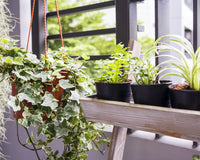Organic farming is as trendy as ever. The techniques we use play an important role in our wellness and the overall ecosystem. There are several organic fertilizers that you can use in your garden or a potting mix. Some of these fertilizers can be produced or obtained at home utilizing everyday items from your kitchen or yard.
Here are 7 of our preferred homemade fertilizers for a wide range of needs.
1. Grass clippings
If you're growing an organic garden, ensure you gather your grass cuttings to use in your garden. Half an inch to an inch of lawn cutting makes a considerable weed-inhibiting mulch. It is also high in nitrogen, which is a crucial nutrient for most plant species.
2. Kitchen scraps
Bring your house and food scraps to work by having made a compost of your own. Compost releases nutrients steadily, which ensures that a well-composted yard can run a year or two without needing the re-use of fertilizer. Compost also allows the soil to preserve water, which is crucial for vegetable gardens to survive during dry, hot seasons.
3. Manure
Manure covers a wide range of sources, including cattle, chickens, and even birds. Each form of manure is rich in nitrogen as well as other nutrients, but you will need to utilize it cautiously. Raw manure is very acidic and has much more nutrition than your plants require so that it can blow your plants. It is appropriate to use composted manure. You could use more of it to increase your soil's water retention capacity without endangering your plants. You won't have to wait long—the manure quickly turns into an excellent soil amendment.
4. Tree leaves
Instead of packing the fallen leaves and throwing them out, gather them for your plants. Leaves are high in essential minerals, draw earthworms, hold moisture, and make dense soils lighter. You could use leaves in two different ways: either mix crushed leaves into potting soil or use them as a mulch to fertilize your plants and avoid weed occurrence.
5. Coffee grounds
Coffee grounds offer a lot of usages, and one of their important advantages is as plant food. Many plants, such as tomatoes, roses, and blueberries, flourish best in acidic soil. Reprocess your coffee grounds to help acidify the soil. There are a few methods to do this—you could either sprinkle the used grounds over the soil surface, or you could make "coffee" to pour into your soils.
6. Eggshells
If you've ever used lime in your yard, then you understand it brings a lot of benefits. It dramatically reduces the acidity of your land for plants that don't love acid. Also, it gives plants a lot of calcium, which is a vital nutrient. Lime itself is an organic fertilizer that you can purchase from any garden center. Instead, you'd want to save some extra cash; there's a cheaper solution to get the same advantages. Take the eggshells out of your pantry, save and crush them to use in your yard. The eggshells are 93% calcium carbonate, which is the scientific name for lime.
7. Banana peels
We eat bananas because of their potassium, and some plants such as rose enjoy potassium as well. Merely dump the peels in a pit next to the rose bush so that they can decompose naturally. As the rose develops, bury the banana peels in the upper layer of the soil. Each of these strategies will provide the much-needed potassium for proper plant growth.
No matter what you are growing in your garden, some or all of these fertilizers will make your plants flourish. In that case, you'll have a garden-grown organically without using synthetic fertilizers.




